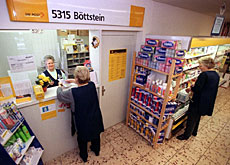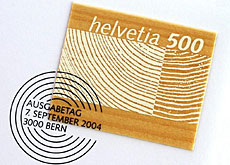Swiss Post faces uncertain future

The Swiss Post Office has warned that it faces an uncertain future, even though it has just published the best half-year results in its history.
The state-run giant says email and increasing competition are taking their toll on the country’s postal services.
Created in 1848 following the unification of cantonal postal services, Swiss Post enjoys a reputation for punctuality and reliability both at home and abroad.
Business appears to be booming. Its latest results, published on Thursday, show that the post office made a record first-half profit of SFr387 million ($302 million) – nearly three times the SFr142 million posted for the first six months of last year.
Warning
But despite the record results, Swiss Post’s managers are warning that the balance sheet may not look so healthy in future.
“Our fears are justified,” said Swiss Post spokesman François Tissot-Daguette.
“You can see it from these two figures: between 2000 and 2003, the number of letters we sent fell by 27 per cent and the number of packets by 32 per cent.”
Swiss Post belongs to the government but has operated as an autonomous entity since 1998.
Over the past few years, its monopoly has been gradually eroded. Private companies are now able to send parcels weighing less than 2kg and the next round of postal service liberalisation is due to come into force by 2009.
Swiss Post is attempting to remain competitive by transforming and scaling back the range of services it offers. The company aims to close 800 small, loss-making post offices by 2006.
But the plan to ditch mainly rural branches has run into stiff opposition from the public. An alliance of interested parties has forced a nationwide vote on the issue on September 26.
Soft drinks and sweets
A change of direction can also be seen in the post office branches themselves, many of which have been transformed into shops selling everything from soft drinks and sweets to toys and computers – all alongside traditional postal services.
“This type of business allows us to generate supplementary income of SFr330 million a year, with which we are also able to save jobs in post offices,” said Tissot-Daguette.
“As things stand, Swiss Post cannot afford just to go on the defensive, but has to develop a strategy to increase sales and reduce administration costs,” he added.
Swiss Post has also been looking to expand into new markets. Nearly ten per cent of its income now comes from financial services such as money transfers, savings accounts and mortgages.
Another 40 per cent of its income comes from logistics and transport and the company is now the market leader in this sector.
Technology
A 21st-century threat to traditional post office services comes from modern communication methods such as email, internet and mobile phone messaging services.
“According to our predictions, new technologies could lead over the next ten years to an annual reduction in the volume of letters worldwide of between one and two per cent,” said Rhéal Le Blanc of the Bern-based Universal Postal Union.
But the United Nations agency does not believe that postal services are destined to die out altogether and maintains that the decline will eventually level off.
Le Blanc points out that some sectors such as advertising are increasingly turning to the postal service to send out mailshots.
Shopping over the internet is also leading to more use of package delivery services.
swissinfo, Armando Mombelli
Swiss Post belongs to the government but has been autonomous since 1998.
Since the beginning of 2004, private companies have been able to send parcels weighing less than 2kg.
Swiss Post deals with 17 million letters and 500,000 parcels daily in nearly 3,000 branches.
Annual turnover is SFr6.8 billion ($5.5 billion).

In compliance with the JTI standards
More: SWI swissinfo.ch certified by the Journalism Trust Initiative












You can find an overview of ongoing debates with our journalists here . Please join us!
If you want to start a conversation about a topic raised in this article or want to report factual errors, email us at english@swissinfo.ch.